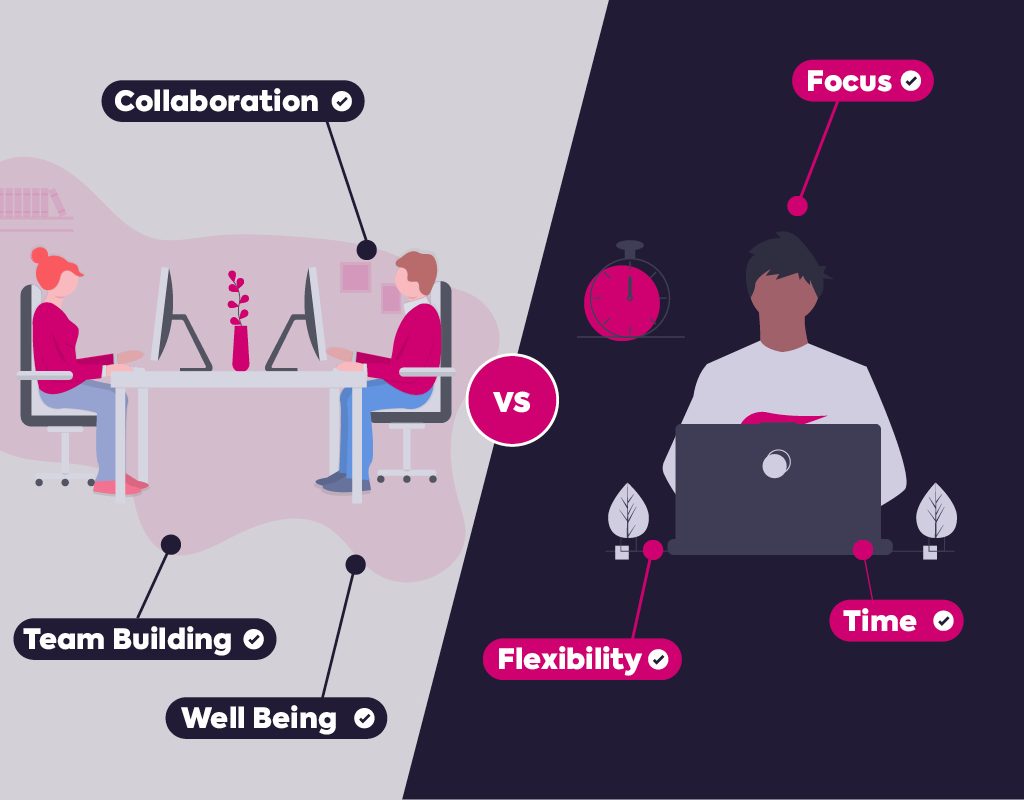
Exploring the Future of Work: Remote and Hybrid Models
The landscape of work is undergoing a transformative shift, driven by technological advancements, changing expectations, and the lessons learned from global events. The traditional model of a fixed office space and a 9-to-5 schedule is evolving, giving rise to remote and hybrid work models. In this exploration, we delve into the future of work, examining the dynamics of remote work, the emergence of hybrid models, and their implications for individuals and organizations.
1. The Rise of Remote Work:
a. Technological Enablers:
– Advancements in communication tools, collaboration platforms, and high-speed internet have empowered individuals to work seamlessly from anywhere.
b. Work-Life Integration:
– Remote work offers flexibility, allowing individuals to integrate work into their lives in a way that suits their personal preferences and responsibilities.
c. Global Talent Pools:
– Organizations can tap into a diverse global talent pool, unconstrained by geographical boundaries, leading to more inclusive and dynamic teams.
2. The Hybrid Work Model:
a. Blend of Office and Remote:
– Hybrid models combine the benefits of in-office collaboration with the flexibility of remote work, striking a balance between structure and autonomy.
b. Customized Approaches:
– Organizations are adopting diverse hybrid approaches, such as flexible scheduling, rotational office days, or project-based in-person collaboration.
c. Employee Choice:
– Hybrid models often empower employees to choose where and how they work, recognizing that different tasks may require different environments.
3. Implications for Organizations:
a. Digital Transformation:
– Organizations are accelerating digital transformation initiatives to support remote and hybrid work, investing in cloud technologies and cybersecurity.
b. Reimagining Office Spaces:
– The role of physical office spaces is evolving, with a focus on creating collaborative and engaging environments rather than a fixed daily workspace.
c. Cultural Adaptation:
– Organizations are reevaluating and adapting their cultures to foster inclusivity, connection, and a sense of belonging in a dispersed work environment.
4. Individual and Team Dynamics:
a. Autonomy and Accountability:
– Remote and hybrid models require individuals to be more autonomous while maintaining a sense of accountability for their contributions.
b. Virtual Collaboration Skills:
– The ability to collaborate effectively in virtual settings, leveraging video conferencing and digital collaboration tools, has become a valuable skill.
c. Team Building and Connection:
– Organizations are exploring creative ways to build team cohesion and foster social connections among remote and hybrid teams.
5. Challenges and Opportunities:
a. Challenges:
– Addressing potential feelings of isolation, ensuring equitable opportunities for remote and in-office workers, and maintaining a cohesive company culture.
b. Opportunities:
– Accessing a broader talent pool, reducing commuting stress, and providing employees with increased flexibility to optimize their work environment.
6. Future Outlook:
a. Continuous Evolution:
– The future of work will likely involve continuous adaptation, with organizations experimenting with different models to find what works best for their unique contexts.
b. Embracing Change:
– Individuals and organizations that embrace change, foster adaptability, and prioritize a positive work experience will navigate the evolving landscape most effectively.
Conclusion:
The future of work is unfolding as a dynamic tapestry, with remote and hybrid models at its forefront. Organizations and individuals alike are navigating this shift, recognizing the need for flexibility, adaptability, and a reimagined approach to collaboration. As we explore this future, it becomes evident that the traditional boundaries of work are expanding, giving rise to new possibilities, challenges, and opportunities for growth.
Whether from the comfort of home, a collaborative office space, or a combination of both, the future of work invites us to reimagine the way we approach our professional lives and the impact we can collectively create in this evolving landscape.
